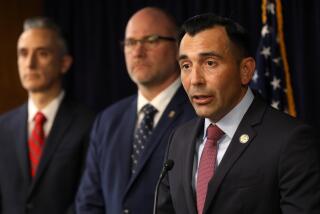Japan Takes Action Against Dai-Ichi Bank
- Share via
TOKYO — Marking a milestone in Japan’s efforts to clean up a scandal-plagued financial industry, the Finance Ministry on Friday filed a criminal complaint against Dai-Ichi Kangyo Bank over payoffs to a corporate racketeer.
The complaint accuses Dai-Ichi Kangyo, one of the nation’s biggest banks, of failing to report loans to the ministry. It marked the first time the ministry has filed a criminal complaint against a major bank for violation of banking laws. It is now up to the Tokyo District Prosecutor’s Office to decide whether to file charges.
Separately Friday, prosecutors indicted former Dai-Ichi Kangyo chairman Tadashi Okuda for allegedly approving $100 million in loans to Ryuichi Koike, the sokaiya, or corporate racketeer, at the center of the widening scandal.
Nomura Securities Co., Japan’s largest brokerage, is the other firm most prominently caught up in the scandal. Its president, Junichi Ujiie, admitted at a Finance Ministry hearing Thursday that Nomura had given $2.8 million in cash to Koike.
Sokaiya are racketeers who extort money from corporations by threatening to reveal embarrassing information at stockholder meetings or otherwise disrupt those gatherings. Japanese managers traditionally prefer to end such meetings quickly with little discussion, and they sometimes hire sokaiya to prevent other sokaiya from causing problems.
Payments to sokaiya are illegal. But until the current scandal broke, little effort was made to crack down on companies that yield to the practice.
Under current Japanese law, even if Dai-Ichi Kangyo is convicted, no significant punishment--aside from further damage to its reputation--will emerge from the courtroom. The maximum penalty per count for conviction is a $4,310 fine, a ministry official said.
The Finance Ministry, however, can also impose administrative penalties that could have a more significant business effect. It is expected to announce penalties against Nomura--and perhaps Dai-Ichi Kangyo too--as early as next week.
“The problem for authorities is the legal structure hasn’t been changed sufficiently quickly to allow for severe penalties for infringements of the law,” said J. Brian Waterhouse, a banking analyst at James Capel Pacific Ltd.
Okuda is just one of 11 former and current Dai-Ichi Kangyo executives arrested in the case. Okuda’s predecessor, Kuniji Miyazaki, committed suicide last month after being questioned by prosecutors.
Waterhouse said that what is being watched by financial markets is whether the Koike scandal will end with Nomura and Dai-Ichi Kangyo or whether it will spread to Japan’s other major brokerages.
A lawyer for the imprisoned Koike said in late June that his client’s brother, Yoshinori Koike, who is also under arrest, claimed that Japan’s three other big brokerages--Daiwa Securities Co., Nikko Securities Co. and Yamaichi Securities Co.--had also made payments similar to Nomura’s.
Etsuko Kawase of The Times’ Tokyo bureau contributed to this report.
More to Read
Sign up for Essential California
The most important California stories and recommendations in your inbox every morning.
You may occasionally receive promotional content from the Los Angeles Times.













